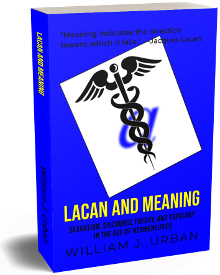LACAN AND MEANING
SEXUATION, DISCOURSE THEORY, AND TOPOLOGY IN THE AGE OF HERMENEUTICS
CHAPTER 3
LACAN ON MEANING
— page 52 —
Section 3.1 opens as the other sections do, with a brief discussion of Freudian dream interpretation. It then examines a few of Lacan’s écrits [writings] for his early efforts to submit psychoanalysis to the imaginary effects of the hermeneutical field. Section 3.2 takes up later écrits to consider how Lacan departs from structuralism proper by his efforts to delimit a cause of meaning via the symbolic order of signifiers. Section 3.3 interrogates two of Lacan’s seminars for his nonsensical objet a, first articulated as the real object qua trauma and then as the real object qua impossible.
3.1 Imaginary Lacan
[I]t is not enough... to say that Freud lived in a scientistic century. Rather, with The Interpretation of Dreams, something of a different essence, of a concrete psychological density, is reintroduced, namely, meaning. From the scientistic point of view, Freud appeared at this point to revert to the most archaic thinking – reading something in dreams. He later returns to causal explanations. But when one interprets a dream, one is always up to one’s neck in meaning. What is at issue is the subjectivity of the subject, in his desires, in his relation to his environment, to others, to life itself. Our task, here, is to reintroduce the register of meaning, a register that must itself be reintegrated on its own level.
—Lacan, November 18, 1953
Before asserting his famous thesis that all dreams are fulfillments of wishes in the third chapter of The Interpretation of Dreams (1900), Freud claims something much simpler: dreams have meaning. Its successful demonstration was a major break from previous thinking. More so than today, in Freud’s time dreams were viewed as absurd and not worthy of serious study. He nevertheless does find enough material for a significant scientific literature review dealing with the phenomenon. But by the second chapter a methodology is announced which will not directly address the specific problems raised in the review. For Freud’s primary concern is to treat the dream in an unheard of way: as a text. As he writes, ‘[t]he title that I have chosen for my work makes plain which of the traditional approaches to the problem of dreams I am inclined to follow. The aim which I have set before myself is to show that dreams are capable of being interpreted... [and] “interpreting” a dream implies assigning a “meaning” to it.’1 The traditional approach is hermeneutical and here is the first level at which Freud can be read. Like any other text the dream has a hidden (or just as often, a ‘secret’ or ‘concealed’) meaning and its extraction requires interpretation. This level has been well appropriated by the academic and non-psychoanalytic interpretive community, which predictably focuses on Freud’s use of classic literature to model the scandalous human ‘complexes’ he uncovered. It is also on
1 Freud, The Interpretation of Dreams, 96.
« prev next »full text of Lacan and Meaning
FREE Lacanian-themed puzzles

